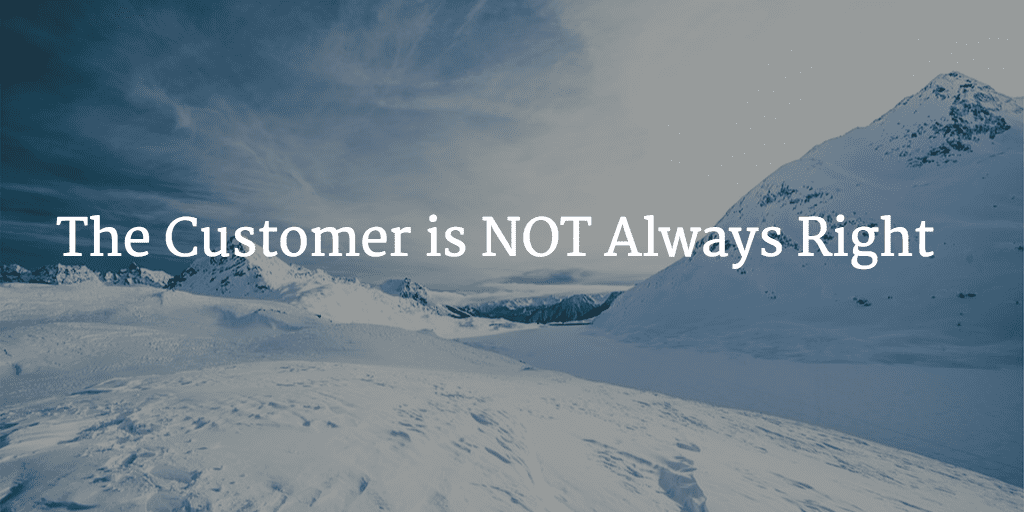One of my favorite Customer Success sayings is: “Not only is the customer not always right, they’re almost always wrong.”
When Dan Steinman, Chief Customer Officer here at Gainsight, came up with that saying, he did so to be provocative and to make a point.
Now, to bring it back around and put everyone at ease, we always follow it with this: “The art of being a great Customer Success Manager (CSM) is telling your customers that they’re wrong and having them LOVE you for it.”
Okay, that’s better… but let’s explore this concept a bit deeper.
The Challenger CSM
If you’ve read a book called “The Challenger Sale“ you’ll understand what I’m talking about.
The premise of the book is that the best sales people are the ones who challenge their customers, not just agree with them. This premise is 100% applicable to CSMs as well.
Not only is it our right to challenge our customers, it’s our obligation.
They’re paying us to guide them down the correct path. Remember that they are using OUR product, not theirs; so who’s better equipped to guide them in the best use of our product than us?
CSM Confidence is Key
Being a Challenger does call for a little intestinal fortitude on the part of the CSM; it requires the CSM to have confidence in their knowledge of the product and domain and in their experience of seeing how the best customers operate.
The challenge (no pun intended) comes with daring to share that wisdom, experience, and expertise with them.
They may resist at first but they will thank you in the long run; you’re operating in their best interest and that can never be wrong.
Change Processes Instead of Product
Allow me to share some history with you.
Once upon a time, software was built and then customized to fit individual customers. In general, customers didn’t change their processes to fit the software; they changed the software to fit their processes.
The Software-as-a-Service (SaaS) model has dramatically altered that equation.
In a true SaaS environment, every single customer is operating off the exact same code base and that means a change for one customer is a change for every customer.
That obviously leads to a situation where we must be very selective about the changes we make since those big, sweeping changes must be applicable to the majority of customers to make any real sense.
One of the results of this new way of doing things is that the smartest customers are changing their processes to fit the software.
They know that technology is a necessary component of their success, recognize that industry best practices are baked into the SaaS (and will continue to be as the best practices evolve over time) and that it’s far easier to adapt to the right solution than to try to force it to adapt to them.
Enter the CSM.
It’s not only no longer prudent to blindly agree to every customer request; in fact, it’s pretty much impossible as you’d have to break your chosen business model to do that.
As a CSM, you have to know your customer’s business, understand their Desired Outcome, and know your product’s capabilities to deliver said outcome… and then bring it all together. Easier said than done, obviously.
This will require you to push, nudge, suggest, coerce, and influence your customers in the direction you want them to go, not on the path they want to go.
And what’s cool is that the best customers will expect – or even require – you to do this.
Other customers will push back and hope to bend you to their will. Your moral high ground is the knowledge of what actually works the best.
Remember what Customer Success is all about… your customers achieving success with your product.
Your job is not to make them happy, but to make them successful and you know best how to do this.
Focus on Their Success to Gain Credibility
Helping your customers achieve success – even if that means maneuvering them in the correct direction against their wishes – is also your path to credibility with your customers.
At some point, the approach of being a “yes person” will leave you sans respect.
After all, what skill does it really take to write down everything a customer asks for and take it back to your Product or Support teams? And how long can you do that in good conscience knowing that isn’t actually helping your customers one bit?
And it gets even better if you go down that road; you’ll not only lose respect with the customer but you’ll kill your credibility internally if your teams believe you are simply saying yes to every customer request and pushing all the work on them.
Respect is gained with your customers AND with your internal teams by simply doing what is right and required – guiding your customers down the BEST path instead of THEIR path.
Credibility isn’t Free
This process of gaining credibility does not come free however.
You have to earn it by being a product expert and a domain expert.
Only with both of those in your backpack will you find yourselves with the skills to be a Challenger CSM.

